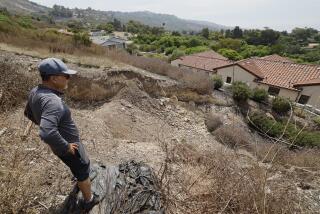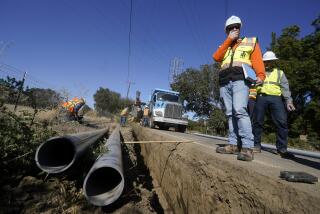TUSTIN : City Delays Action to Bury Utility Lines
- Share via
The City Council has postponed action on a proposal to remove electrical poles and bury utility lines along a stretch of Red Hill Avenue after protests from property owners.
Council members decided Monday to take up the matter again next month, and directed city employees to tell property owners how much the project would cost them.
A preliminary estimate by the city’s Public Works Department indicated that each property owner may have to spend up to $1,600 to reconnect their electric service after the utility lines are placed underground.
“In this economy, it’s outrageous,” said Karl Kovac, one of the nine property owners.
City officials said that the Red Hill project is part of the city’s effort to put all utility lines underground for safety considerations. In addition, they said the removal of overhead utility lines helps beautify the city.
Robert Ledendecker, the city’s public works director, said the area is on Red Hill Avenue from Copperfield Drive to Nisson Road.
He said the California Edison Co. will spend $250,000 for the project while the city will spend $6,000 to install new street lights. It will take a year to 18 months to finish the project, he said.
A customer service planner for California Edison Co. said that the cost of reconnecting service may not be as high as the city estimates.
Mike Bedell said the cost would range from $200 to $300 for a private electrician to set up a connector box into which the electric company can reconnect electrical service.
But a resident, Berklee Maughn, said that if placing utility lines underground is a safety issue, then everybody should pay for it, and not just the property owners.
“The (electric) poles have been there at least 40 years, but no cars have been hit,” Maughn said. “If you want to beautify the city, I’m all for it, but spread the cost around. I don’t understand why the property owners should be hit with this cost.”
City Atty. James G. Rourke said that “the city cannot pay for the improvements on private property. The property owner has to pay for it,” he said.
More to Read
Sign up for Essential California
The most important California stories and recommendations in your inbox every morning.
You may occasionally receive promotional content from the Los Angeles Times.













